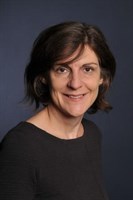27 March 2018
 Dr Louise Fleming, paediatric respiratory consultant at Royal Brompton Hospital and clinical senior lecturer at Imperial College London, has been awarded £250,000 from Asthma UK for a senior clinical fellowship, recognising her track record of challenging, original and productive research.
Dr Louise Fleming, paediatric respiratory consultant at Royal Brompton Hospital and clinical senior lecturer at Imperial College London, has been awarded £250,000 from Asthma UK for a senior clinical fellowship, recognising her track record of challenging, original and productive research.
The fellowship will allow Dr Fleming to investigate whether it is possible to improve how asthmatic children use their prescribed inhalers.
Currently, inhalers are not always effective in children because they are not taken as intended. Failure of the medical team to recognise this can lead to an unnecessary increase in the dose of medication prescribed. In recent years, ‘smart inhalers’ have been attached to children’s usual inhalers to record use. A major drawback, however, is that these smart inhalers only measure if the device has been used, not if it has been used correctly.
Dr Fleming will look at three novel technologies that accurately monitor how and when an inhaler is used. Together with feedback from the children and their parents on their ease of use, these results will then determine which single technology to take forward into a larger study. Dr Fleming will also create a short motivational video to encourage the children to take back control of their asthma.
Dr Fleming said: “I am hugely grateful to Asthma UK for their support. This is an exciting opportunity to address one of the key barriers to good asthma control and try to improve adherence in children and young people with asthma. This is a rapidly developing field; however, before introducing new technologies into clinical care it is important that we ensure they are user-friendly, acceptable to children and their families and provide us with the information we need to achieve the desired outcomes.”
This study will help to identify the most appropriate and effective devices and whether additional benefit can be gained from combining them with a low-cost motivational film.
To find out more about Dr Louise Fleming and her research, read our Q&A with her for International Women and Girls in Science Day 2018.
If you would like to find out more about any of our research, please email us.
